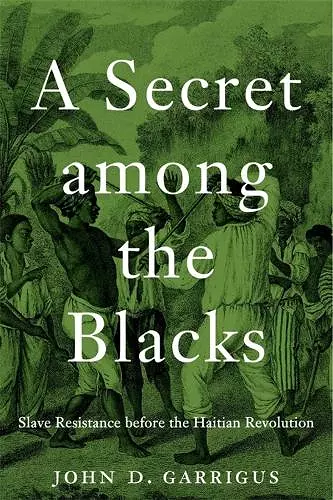A Secret among the Blacks
Slave Resistance before the Haitian Revolution
Format:Hardback
Publisher:Harvard University Press
Published:27th Oct '23
Should be back in stock very soon

A bold rethinking of the Haitian Revolution reveals the roots of the only successful slave uprising in the modern world.
Unearthing the progenitors of the Haitian Revolution has been a historical project of two hundred years. In A Secret among the Blacks, John D. Garrigus introduces two dozen Black men and women and their communities whose decades of resistance to deadly environmental and political threats preceded and shaped the 1791 revolt.
In the twenty-five miles surrounding the revolt’s first fires, enslaved people of diverse origins lived in a crucible of forces that arose from the French colonial project. When a combination of drought, trade blockade, and deadly anthrax bacteria caused waves of death among the enslaved in the 1750s, poison investigations spiraled across plantations. Planters accused, tortured, and killed enslaved healers, survivors, and community leaders for deaths the French regime had caused. Facing inquisition, exploitation, starvation, and disease, enslaved people devised resistance strategies that they practiced for decades. Enslaved men and women organized labor stoppages and allied with free Blacks to force the French into negotiations. They sought enforcement of freedom promises and legal protection from abuse. Some killed their abusers.
Through remarkable archival discoveries and creative interpretations of the worlds endured by the enslaved, A Secret among the Blacks reveals the range of complex, long-term political visions pursued by enslaved people who organized across plantations located in the seedbed of the Haitian Revolution. When the call to rebellion came, these men and women were prepared to answer.
Offers a fresh perspective on the resistance of the enslaved…Focusing on individual figures such as the African-born Médor, [Garrigus] makes a plausible case for his revisionist version of the Makandal story and sheds a revealing light on the wider origins of the Haitian revolution. -- Sudhir Hazareesingh * Times Literary Supplement *
One of the most exciting and important history books I read this year…Lucidly and grippingly written, Garrigus’s book is a model of historical scholarship, with vivid portraits of individual enslaved people. -- David A. Bell * Chronicle of Higher Education *
Brilliant…challenges a core myth – that the revolution was a sudden eruption – revealing instead a gripping tale of a population on the path to revolution over decades, a story of communities of secret keepers resisting while building the loyalties that made the revolution, once ignited, a success. -- Desirée Baptiste * Times Literary Supplement *
A compelling study of the Haitian Revolution’s immersion in the Atlantic diaspora, its ethnic diversity, and the rich medicinal culture derived from it. -- Isadora Moura Mota * American Historical Review *
Makes a convincing case for a seemingly obvious, yet understudied, explanation for the Haitian Revolution. -- Philippe Girard * Journal of Global Slavery *
A riveting read and a transformative contribution to our understanding of resistance and revolution in the Caribbean and the Atlantic World. Garrigus vividly brings us into a world shaped by the work of divining, healing, and resistance, showing us how this world nurtured the alternative visions for the future that ultimately made the Haitian Revolution imaginable—and therefore possible. -- Laurent Dubois, author of Avengers of the New World: The Story of the Haitian Revolution
The clearest, most sophisticated account I have read of the cultures of resistance that would help fuel the Haitian Revolution. Garrigus shows that enslaved men and women developed a range of complex, long-term political visions and pursued them by organizing across plantations, a powerful response to the argument that plantation slavery, especially in the Caribbean, was so harsh that it blocked political development among the enslaved. This important book is essential reading for historians of the Atlantic world and African diaspora, and should be read widely outside the academy. -- James Sidbury, author of Becoming African in America: Race and Nation in the Early Black Atlantic, 1760–1830
An engaging, sympathetic portrait of a population on the path to revolution. Drawing on sources very few historians have studied and linking familiar events in novel ways, Garrigus gives us an imaginative reworking of the theme of slave resistance and how it related to the Americas’ greatest slave uprising. -- David Patrick Geggus, author of Haitian Revolutionary Studies
Concise, creative, and deeply researched. Combining ethnohistory with archival sleuthing, Garrigus uncovers communities of slave resistance in the French colony of Saint-Domingue in the decades prior to the Haitian Revolution. African healing and ritual practices were not only used as a means of self-preservation in an atmosphere of chronic hunger, overwork, physical abuse, and disease; they also created communities among the enslaved that envisioned, and worked toward, a better world beyond the degradation of slavery. -- Paul Cheney, author of Cul de Sac: Patrimony, Capitalism, and Slavery in French Saint-Domingue
ISBN: 9780674272828
Dimensions: 210mm x 140mm x 20mm
Weight: 408g
256 pages